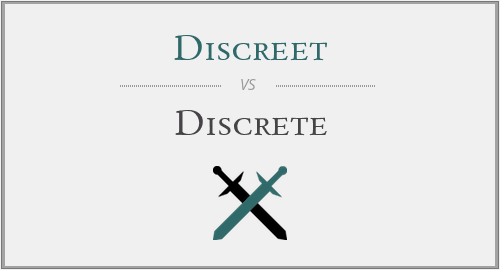The government’s discreet decision about the four discrete divisions caused a lot of uprising.
The two very similar words; discreet and discrete are used in the above sentence, are you familiar with the words? Do you think they mean the same? If not, do you what each of them mean?
Discreet and discrete are two homophones that have similar pronunciation but very different meanings and spellings. These types of words are often confused with each other in English language where people can’t tell them apart so they misuse them in their writings. This article will help you clear up your confusions regarding discreet and discrete so you can tell when to use which without making a mistake.
Discreet as adjective:
Originated form the Late Latin word discretio which means “discretion”, discreet is used as an adjective in English language where it reflects a person’s ability to be careful and prudent in one's speech or actions, especially in order to keep something confidential or to avoid embarrassment. We made some discreet inquiries about the case. Another meaning of discreet is given as something that is intentionally unobtrusive. She gave a discreet cough.
Please be discreet regarding this matter.
Discrete as adjective:
The word discrete is also a descendant of Latin word discretus which means “separate”. Like discreet, it is also used as an adjective in English language where it implies that someone or something is individually separate and distinct. Speech sounds are produced as a continuous sound signal rather than discrete units. It has synonyms like separate, distinct, individual, detached and disjointed.
Natasha is a great, wise and discrete writer.
Examples:
To be able to combine discrete characteristics of species is a dream of science. (Genetics and Literature)

However, the actor hasn’t curbed his behaviour completely—he’s just more discreet. (Zimbio)
December is a series of discrete expeditions, and energy must be budgeted if you’re to go the distance. (Independent)
Leave it to the reigning queen of ugly chic to make décolletage discreet and quietly subversive. (NY Times)
There is still color, but in discrete bursts: the orange of a 1965 Olivier Mourgue Djinn Relaxer, the cobalt blue of a 1968 Bouloum chaise, the red of a 1968 Kazuhide Takahama Suzanne sofa. (NY Times)
Roja is discreet about his clients, but notes that he is “off to Russia” next week for conduct a “fitting” for one super-rich customer. (Telegraph)
Discreet or discrete:
Discreet implies the showing of reserve and prudence in one’s behavior or speech. Discrete means something quite different: “distinct, separate, and unrelated.” Although these homophones share French and ultimately Latin roots, they differentiated early in their use in English, and both have now borne their modern meanings for approximately five centuries. Discretion is the noun corresponding to discreet, so discretion is a cautious, reserved, or modest manner, and the word is also extended to mean freedom to act on one’s own judgment. Discrete‘s corresponding noun is discreteness.
We hope you find this discrete article helpful.




Have a discussion about this article with the community:
Report Comment
We're doing our best to make sure our content is useful, accurate and safe.
If by any chance you spot an inappropriate comment while navigating through our website please use this form to let us know, and we'll take care of it shortly.
Attachment
You need to be logged in to favorite.
Log In